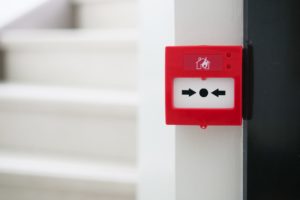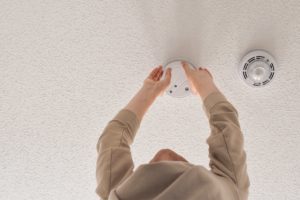Fire safety is a crucial consideration for both residential and commercial properties. Whether you’re a homeowner or a business owner, ensuring that you have an effective fire alarm system in place is not just about peace of mind—it’s about fulfilling your legal obligations and safeguarding lives.
The Regulatory Reform (Fire Safety) Order 2005 sets out strict requirements for fire safety in England and Wales, making it essential for property owners to choose the right system for their needs.
In this article, we’ll explain the various types of fire alarm systems to help you choose the right system for your requirements.
Fire Alarm Systems: Why Are They Essential?

Fire alarm systems are a cornerstone of any fire safety strategy. Their primary function is to provide early warning in the event of a fire, enabling a rapid response that can save lives, protect property, and minimise damage. Early detection is crucial because it allows occupants to evacuate safely and gives emergency services more time to respond effectively.
In commercial settings, fire alarm systems aren’t just essential for employee and customer safety, but are also a legal requirement. Compliance with fire safety regulations, such as those outlined in the Regulatory Reform (Fire Safety) Order 2005, is mandatory. Failure to meet these standards can result in severe penalties, including fines, business closures, and, in extreme cases, imprisonment.
For homeowners, the regulatory requirements may be less stringent but it’s just as important to have a fire alarm system. Fire alarms, smoke detectors, and carbon monoxide detectors are critical components of a safe home environment. They offer protection against the unpredictable nature of fire hazards.
BES Security provides expert consultation and installation services tailored to meet the specific needs of your property, ensuring full compliance.
Different Types of Fire Alarm Systems Explained
When it comes to fire alarm systems, one size does not fit all. The right system for your property depends on various factors, including the size of the building, the layout, and the specific fire risks involved. Here, we’ll break down the primary categories of fire alarm systems to help you understand which might be the best fit for your needs.
Conventional Fire Alarm Systems
Conventional fire alarm systems are the most straightforward type of fire alarm system available. These systems divide the property into zones, each with a number of detectors and call points. When a detector or call point is activated, the system triggers an alarm and indicates the zone in which the fire has been detected. While it does not specify the exact location, it provides a general area for first responders to investigate.
Conventional systems are typically best suited for smaller properties or businesses with a limited budget. Their simplicity and cost-effectiveness make them an ideal choice for environments where the risk is lower.
Addressable Fire Alarm Systems
Addressable fire alarm systems offer a more advanced solution compared to conventional systems. Each device in an addressable system has a unique address, allowing the system to pinpoint the exact location of a fire. This precise identification can significantly speed up the emergency response, reducing potential damage and enhancing safety.
These systems are particularly well-suited for larger buildings with more complex layouts, such as office buildings, hotels, or industrial facilities, where knowing the exact location of a fire is crucial. The added complexity and features make addressable systems a more expensive option, but the investment is often justified by the enhanced safety and efficiency they provide.
Types of Fire Alarms: Choosing the Right Detection Device
Selecting the right type of fire alarm for your property is just as important as choosing the right system. Different types of fire alarms are designed to detect different kinds of fires. The best choice often depends on the specific conditions and risks in the area being protected.
Optical Fire Alarms
Optical fire alarms, also known as photoelectric alarms, detect fires by using a light sensor to identify the presence of smoke. These alarms are particularly effective at detecting slow-burning, smouldering fires, which produce larger smoke particles.
Because of their sensitivity to smoke, optical fire alarms are ideal for living areas such as bedrooms, lounges, and hallways, where these types of fires are more likely to occur.
Ionisation Fire Alarms
Ionisation fire alarms work differently from optical alarms. They are designed to respond more quickly to fast-flaming fires, such as those fueled by paper, oil, or other flammable materials. Ionisation alarms use a small amount of radioactive material to create an ionisation chamber; when smoke enters this chamber, it disrupts the flow of ions, triggering the alarm.
These alarms are better suited for areas like kitchens or workshops, where the risk of rapid fire spread is higher. However, they are more prone to false alarms from cooking or steam, so placement should be carefully considered.
Heat Alarms
Heat alarms detect fires based on the rise in temperature rather than the presence of smoke. They are highly effective in areas where smoke alarms might trigger false alarms due to cooking fumes or dust, such as kitchens and garages. Heat alarms respond when the temperature exceeds a certain threshold, making them ideal for environments where high temperatures are a key indicator of a fire.
The Importance of Emergency Lighting in Fire Safety
Emergency lighting is a crucial component of fire safety, playing a vital role in ensuring that individuals can safely evacuate a building during a fire or other emergencies. In the event of a power failure, which is common during fires, emergency lighting provides the necessary illumination to guide people through escape routes, reducing the risk of injury and ensuring a swift evacuation.
For commercial properties and public buildings, the installation of emergency lighting is not just recommended; it is a legal requirement. Regulations stipulate that all escape routes, exits, stairways and corridors must be adequately lit by emergency lighting systems.
These regulations are in place to ensure that everyone in the building can find their way to safety, even in the darkest conditions. Failure to comply with these requirements can result in severe penalties, including fines and potential closure of the business.
AOV Systems: Enhancing Fire Safety in Large Buildings
Automatic Opening Vent (AOV) systems are specialised fire safety systems designed to control the spread of smoke and heat during a fire. AOV systems work by automatically opening vents, windows, or louvres when a fire is detected, allowing smoke and hot gases to escape from the building. This helps to maintain visibility, reduce temperature, and create a safer environment for occupants to evacuate and for firefighters to operate.
AOV systems are particularly important in multi-story buildings and high-risk environments where smoke and heat can quickly accumulate, making evacuation difficult and dangerous. AOV systems are critical for maintaining air quality and preventing smoke inhalation. By ventilating smoke and heat, AOV systems help to keep escape routes clear, ensuring that occupants can exit the building safely and efficiently.
Carbon Monoxide (CO) Alarms
Carbon monoxide alarms are essential for detecting the presence of carbon monoxide gas, which is odourless, colourless, and highly dangerous. CO is produced by the incomplete combustion of carbon-containing fuels, and can be produced by faulty appliances. High risk areas in the home include kitchens, garages and any space with a furnace, fireplace, or gas boiler.
Unlike other fire alarms, CO alarms do not detect fire directly but are critical for protecting against this silent threat. They are a must-have in both residential and commercial properties, especially those with gas-powered devices. They provide early warning of dangerous CO levels that could otherwise go unnoticed until it’s too late.
It is recommended that every home and commercial property has a CO alarm installed.
How to Choose the Best Fire Alarm System for Your Needs

Selecting the right fire alarm system for your property involves careful consideration of several factors. By taking into account the size and layout of your building, the specific fire risks it faces, and your budget, you can make an informed decision that balances safety and cost-effectiveness.
Consider the Size and Layout of Your Property
The size and complexity of your building are key factors in determining whether a conventional or addressable fire alarm system is more suitable. For smaller properties or those with simpler layouts, conventional systems can provide adequate protection at a lower cost.
However, for larger buildings with multiple floors or complex designs, an addressable system offers superior functionality by pinpointing the exact location of a fire, which is critical for ensuring a rapid and effective response.
Assess Your Fire Risk Level
Understanding the specific fire risks associated with your property is essential for choosing the right fire alarm types. For instance, properties that handle flammable materials or have kitchens and workshops with a higher risk of fast-spreading fires may benefit from ionisation alarms.
On the other hand, areas like living rooms or bedrooms, where smouldering fires are more common, might be better served by optical alarms.
Budget Considerations
While safety should always be the top priority, budget considerations inevitably play a role in choosing a fire alarm system. For those with limited budgets, conventional fire alarm systems offer a cost-effective solution without compromising on basic safety.
For properties that require more advanced features, installing an addressable system is a worthwhile investment. It’s important to strike a balance between comprehensive protection and affordability.
Fire Alarm Installation and Compliance: Why BES Security is Your Trusted Partner
When it comes to fire alarm systems, professional installation is not just recommended—it’s essential. Proper installation ensures that your fire alarm system functions properly, providing early warning in the event of a fire.
This is especially important because fire safety is governed by strict regulations that require compliance to avoid severe penalties, including fines and potential business closures.
At BES Security, we understand that every property is unique, which is why we offer bespoke fire alarm solutions tailored to the specific needs of both domestic and commercial clients.
Whether you’re protecting your home or a large commercial building, our expert team will assess your property, design a system that meets all legal requirements, and ensure it is installed to the highest standards.
For more detailed information on our services, visit our Fire Systems page.
Fire Alarm Systems FAQs
What is a fire alarm, and why is it important?
A fire alarm is designed to detect fire by monitoring environmental changes associated with combustion, e.g. smoke or heat. The primary importance of a fire alarm lies in its ability to provide early detection, giving occupants critical time to evacuate and allowing emergency responders to tackle the fire before it spreads.
What are the different types of fire alarms available?
There are four main types of fire alarms, each suited to different fire detection needs:
- Optical Fire Alarms: Detect slow-burning, smouldering fires using light sensors, ideal for living areas.
- Ionisation Fire Alarms: Respond quickly to fast-flaming fires, better suited for kitchens and areas prone to rapid fire spread.
- Heat Alarms: Sensitive to temperature changes, making them perfect for kitchens and garages.
What is the difference between a conventional and an addressable fire alarm system?
The key difference between conventional and addressable fire alarm systems lies in how they detect and report fires:
- Conventional Fire Alarm Systems divide the property into zones. When a fire is detected, the system identifies the general zone, but not the specific location within that zone.
- Addressable Fire Alarm Systems Each device has a unique address, allowing the system to pinpoint the exact location of the fire, making them ideal for larger or more complex buildings.
What are the legal requirements for fire alarms in commercial buildings?
Commercial buildings must comply with the Regulatory Reform (Fire Safety) Order 2005. This mandates that appropriate fire detection and alarm systems are in place.
The specific requirements depend on the size, layout, and purpose of the building. Generally it includes the installation of fire alarms, emergency lighting, and regular risk assessments. Compliance is essential to avoid fines, business closures, or harm to employees.
What type of fire alarm is best for my home?
For residential properties, a combination of optical and carbon monoxide alarms is often recommended. Optical alarms are effective in detecting smouldering fires, which are common in living areas. Carbon monoxide alarms are crucial for detecting dangerous gas leaks in homes with gas appliances.
Heat alarms may also be beneficial in kitchens and garages to avoid false alarms while providing reliable fire detection.
Can I install a fire alarm system myself?
While it may be tempting to install a fire alarm system yourself, professional installation is strongly advised. Proper installation ensures that the system is fully compliant with legal requirements and functions correctly in an emergency. BES Security provides expert installation services, backed by years of experience and knowledge of current fire safety regulations. We also conduct risk assessments to tailor the system to your specific needs.
How often should fire alarms be tested and maintained?
Fire alarms should be tested regularly to ensure they are functioning correctly. For commercial properties, a weekly test is recommended. More thorough inspections should be conducted every six months to a year, depending on the system and legal requirements. We offer maintenance and testing services to keep your fire alarm system in optimal condition for continuous protection and compliance.


